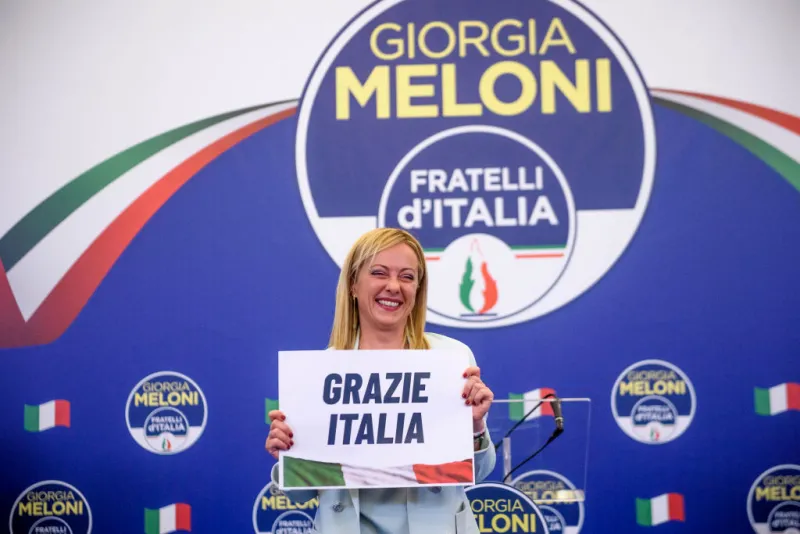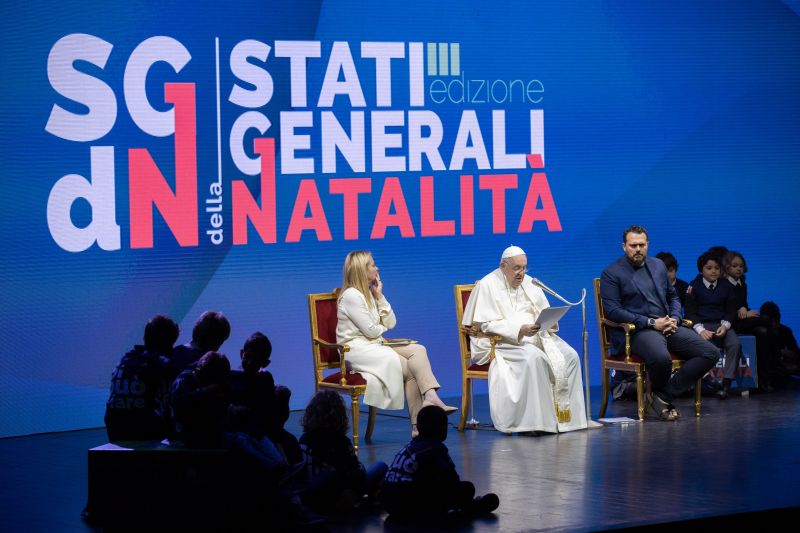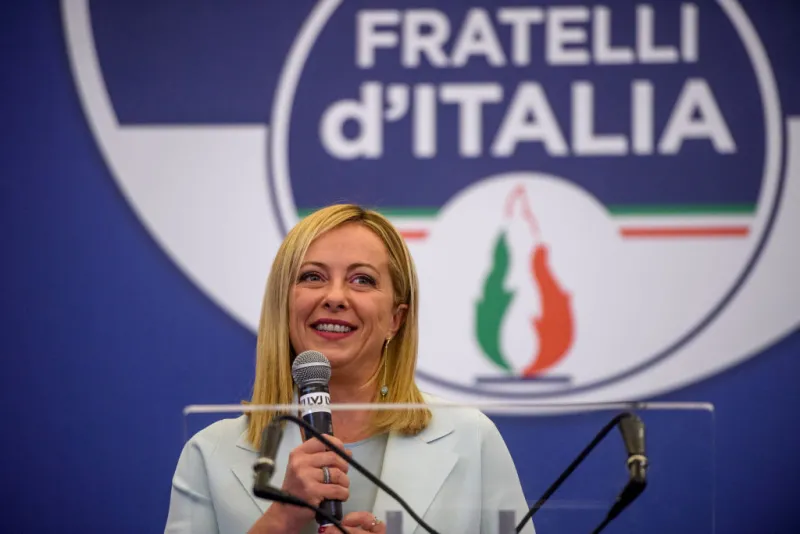 Giorgia Meloni, leader of the Fratelli d’Italia (Brothers of Italy) holds a “Thank You Italy” sign during a press conference at the party electoral headquarters on Sept. 25, 2022 in Rome. / Photo by Antonio Masiello/Getty Images
Giorgia Meloni, leader of the Fratelli d’Italia (Brothers of Italy) holds a “Thank You Italy” sign during a press conference at the party electoral headquarters on Sept. 25, 2022 in Rome. / Photo by Antonio Masiello/Getty Images
Rome, Italy, Sep 29, 2022 / 11:00 am (CNA).
The victory of Giorgia Meloni and her “Fratelli d’Italia” (Brothers of Italy) party in Italy’s recent election made global headlines.
Meloni won with a platform that supports traditional families, national identity, and the country’s Christian roots. In a speech earlier this year, she said “no to the LGBT lobby, yes to sexual identity, no to gender ideology.”
As the leader of a party that originates from a postwar movement born from the ashes of fascism, Meloni can neither be called a post-fascist nor simply a far-right leader.
Her international position is Atlanticist, and she has supported Ukrainian President Volodymyr Zelenskyy, congratulating him on his election.
On European issues, Meloni is critical of how Europe runs the risk of imposing policies on nation-states, but she is not against the principle of a European Union.
In short, the reality of Meloni’s politics is much more nuanced than it may seem at first glance. This explains why Catholic hierarchies in Italy have shown a degree of openness toward the politician following her electoral victory.
Italian political background
Italy’s history plays an essential role in understanding this reality. After fascism, the Italian state was reconstituted with a powerful Catholic party, the Christian Democrats, which for decades was the undisputed leader in the elections.
Catholics had been among the first opponents of fascism.
The Italian Constitution was inspired by a group of Catholics who, in 1943, already toward the end of the war, had gathered in the monastery of Camaldoli in Tuscany to define the principles for a post-fascist state.
In the early 1990s, a widespread corruption scandal in Italian politics called Tangentopoli wiped out traditional parties, including the Christian Democrats.
New parties arose, and members of the Christian Democrats joined these or were part of varying political formations.
The current Italian Democratic Party, considered center-left, is made up of former members of the Christian Democrats as well as members of the old left parties.
The secretary, Enrico Letta, had a background with the Christian Democrats. Similarly, parties considered to be center-right in Italy, such as Berlusconi’s Forza Italia, include among their ranks heirs of the Christian Democrats but also former socialists and former members of the Italian Liberal Party, traditionally secular and in some respects even anti-clerical.
The Italian Church had initially supported the so-called center party, which was the first direct heir of the Christian Democrats. Soon, however, the policy of the Italian bishops became not to support political formations but rather the values and themes promoted within the various parties — no longer, therefore, a Catholic party, but Catholics in politics.
In the 1990s and early 2000s, Cardinal Camillo Ruini was the Italian Bishops’ Conference president. In the face of tremendous parliamentary battles, Ruini coined the expression “nonnegotiable values.”
By nonnegotiable values, he first meant the importance of life at a time when political actions promoted euthanasia, in-vitro-fertilization, and even abortion as a matter of personal conscience.
After the bishops’ conference presidency of Ruini and that of Cardinal Angelo Bagnasco, the question of nonnegotiable values has become more nuanced.
With Cardinal Gualtiero Bassetti, who became president of the Italian Bishops’ Conference in 2014, the Church in Italy has aimed more at a concrete look at the issues of poverty and the economy, arguably losing sight, somewhat, of the values platform.
It was a strategic choice dictated by the fact that Catholics in politics were increasingly marginalized and that the social doctrine of the Church took less and less space in the formation of the new ruling class. There were attempts to create new platforms of Catholic culture in the early 2010s. These were sidelined by an economic-institutional emergency that had led to economist Mario Monti leading the government.
To all this, it must be added that the culture in Italy has been strongly forged by leftist thinking. It should be remembered that Italy had the largest Communist Party beyond the Iron Curtain after the war.
The Communist Party strongly developed an anti-fascist resistance narrative. Yet, the communist partisans were also authors of heinous murders and systematic elimination of priests — for instance, the recently beatified seminarian Rolando Rivi.
The Catholic platform in Italy
The historical context explains how Catholic thought in Italy was forged, especially in the years following the Second Vatican Council. Then, Catholicism in Italy fluctuated between the need for identity and the narrative of a rupture, which wanted a Church more committed to social issues and less to the centers of power.
A case in point: The latest bill against homophobia, which could have introduced gender classes in schools, was strongly supported by the Italian Democratic Party, led by the former Christian Democrat Letta.
It is not surprising, therefore, that the Catholic vote in Italy has rewarded Giorgia Meloni. Lacking a political party of reference, the Catholic center looked to the party that most corresponded to specific values.
Meloni’s voters are likely people who attended Family Day events held in Italy in 2007 and 2016 to oppose two bills on the civil unions.
The organizer of the most recent Family Day, Massimo Gandolfini, said in 2019: “We recognize that Brothers of Italy and Giorgia Meloni are pursuing a policy to the advantage of the family, for the defense of life from conception to natural death, and the educational freedom of parents.”
On the other hand, Meloni has been met with skepticism and concerns over leading a party with a fascist legacy.
Much attention was paid to her meeting with Cardinal Robert Sarah, prefect emeritus of the Congregation for Divine Worship. But there were other talks with Vatican figures. Rumors also speak of contact with Cardinal Pietro Parolin, the Vatican’s secretary of state.
Added to this is a meeting with Cardinal Matteo Zuppi, president of the Italian Bishops’ Conference. In an interview with the Italian bishops’ newspaper Avvenire on Sept. 28, Zuppi made it clear that he knew Meloni well. He also described the Church in Italy as committed to collaborating with all parties.
To fully understand the context, it is worth remembering that Zuppi is an exponent of Sant’Egidio, a movement closer to the demands of the center-left than the center-right.
The Italian bishops’ position
In general, the Italian bishops do not endorse any particular political candidate, keep a low profile, and only issue statements regarding the bishops’ conference president or possibly the secretary of state.
Meloni also kept a low profile. Compared with others, her campaign did not exploit religious faith. While setting what is generally considered a conservative tone, Meloni’s rhetoric was political, not religious.
The president of the “Fratelli” is described by those who know her as someone “who considers herself part of the Church, very respectful of Pope Francis even when perhaps she does not understand or share certain [aspects] of his statements or acts.”
She was also present at the Communion and Liberation Meeting in Rimini, which takes place every August, and spoke about Catholic social teaching.
Brothers of Italy and the Italian Church
Cardinal Ruini, whose voice still carries weight, said in an interview with Corriere Della Sera on Sept. 28, “intellectuals are on the left, but the real country is on the right.” He acknowledged the reality of Meloni’s role and her party’s election.
In doing so, Ruini pointed out that the Catholic world in Italy has been closer to the so-called center-left rather than the center-right. In Italy, as elsewhere, there is a perception of a deep rift between those who stand up for nonnegotiable values and those who instead support a more pragmatic approach to dealing with contemporary challenges. But this is a perception, and reality is more nuanced.
Perhaps now is the time for a nuanced reconciliation of opposites for the Italian Catholic world. Giorgia Meloni is not a Catholic politician. The values she espouses, however, also won over the Catholic electorate. This is a reality to be ignored at peril.
[…]








